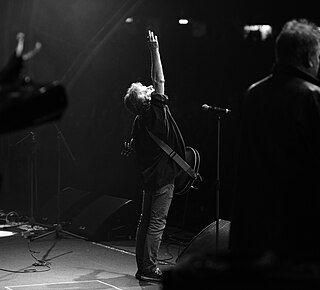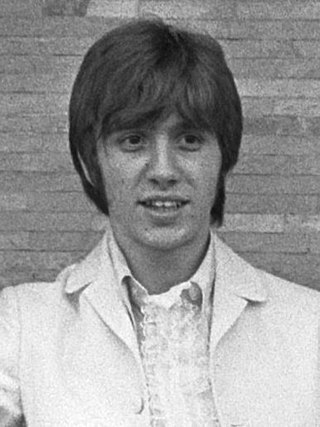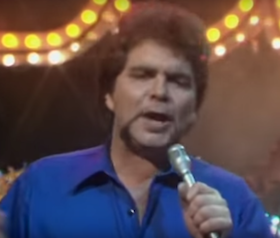Related Research Articles

The Stems are a garage punk band founded by Dom Mariani in Perth, Western Australia in late 1983. The group is heavily influenced by 1960s garage rock and 1970s power pop. They broke up in August 1987 and reformed in 2003, releasing a new album in 2007. Although the group disbanded in October 2009, as of 2013 The Stems are an ongoing live concern.

Moving Pictures are an Australian rock music band formed in 1980. Their debut album, Days of Innocence, was issued in October 1981 and eventually peaked at No. 1 on the Kent Music Report Albums Chart in February the following year. In January 1982, they released their single, "What About Me", which reached No. 1 on the Kent Singles Chart. Later that year, Elektra Records issued Days of Innocence and "What About Me" in North America. The single reached No. 29 on the Billboard Hot 100 and appeared on the associated year-end Hot 100 list for 1983. A proposed series of United States performances supporting REO Speedwagon, Tom Petty, and Hall & Oates fell through when Elektra was substantially reorganised.

INXS is the debut studio album by Australian rock band INXS. It was released on Deluxe Records in Australia on 13 October 1980. The band recorded the album in midnight to dawn sessions during 1979 to 1980 after performing, on average, two gigs a day at local pubs around Sydney. All tracks were credited to band members, Garry Gary Beers ; brothers Andrew, Jon (drums) and Tim Farriss ; Michael Hutchence ; and Kirk Pengilly. The album was co-produced by the band and Duncan McGuire. It spawned the single, "Just Keep Walking", which became their first Australian Top 40 hit. INXS peaked in the Top 30 of the related Kent Music Report Albums Chart. The album did not appear internationally until 1984.

Stephen Carlton Wright was an Australian singer, songwriter, and musician. Called Australia's first international pop star, he is best known for being the lead singer of the Easybeats, who are widely regarded as the greatest Australian pop band of the 1960s.

William Richard Thorpe AM was an English-born Australian singer-songwriter, and record producer. As lead singer of his band Billy Thorpe & the Aztecs, he had success in the 1960s with "Blue Day", "Poison Ivy", "Over the Rainbow", "Sick and Tired", "Baby, Hold Me Close" and "Mashed Potato"; and in the 1970s with "Most People I Know Think That I'm Crazy". Featuring in concerts at Sunbury Pop Festivals and Myer Music Bowl in the early 1970s, the Aztecs also developed the pub rock scene and were one of the loudest groups in Australia.
The Missing Links were an Australian garage rock, R&B, and protopunk group from Sydney who were active from 1964 to 1966. The group was known for wearing their hair long and smashing their equipment on-stage. Throughout the course of 1965, the band would go through a complete and total lineup change resulting in two completely different versions of the band: the first consisted of Peter Anson on guitar, Dave Boyne on guitar, Bob Brady on vocals, Danny Cox on drums and Ronnie Peel on bass and released their debut single, "We 2 Should Live" in March 1965.

Colin John Burgess was an Australian rock musician who was the drummer in the Masters Apprentices from 1968 to 1972. He was later the original drummer with hard rock band AC/DC from November 1973 to February 1974. The Masters Apprentices had top 20 singles chart success with "5:10 Man", "Think about Tomorrow Today", "Turn Up Your Radio" and "Because I Love You".
Mondo Rock are an Australian rock band, formed in November 1976 in Melbourne, Victoria. Singer-songwriter Ross Wilson founded the band, following the split of his previous band Daddy Cool. Guitarist Eric McCusker, who joined in 1980, wrote many of the band's hits, and along with Wilson formed the core of the group. They are best known for their second album, Chemistry, which was released in July 1981 and peaked at number 2 on the Australian Kent Music Report. Their song "Come Said the Boy" peaked at number 2 in Australia in 1983.

"I'll Be Gone" or "Some Day I'll Have Money" is a song by Australian progressive rock group Spectrum released as their debut single by EMI on Harvest Records in January 1971. It peaked at #1 on the national singles chart, while it reached Top 5 in Melbourne, Sydney and Brisbane. The song was written by guitarist and vocalist Mike Rudd, and produced by Howard Gable. The B-side, "Launching Place Part Two" was written to promote a music festival. Spectrum never repeated the success of "I'll Be Gone".

Sherry Rich or Sherry Rich-Plant is an Australian alternative country singer-songwriter, guitarist and music teacher. As Sherry Valier, she formed an all-girl garage rock band, Girl Monstar (1988–93), on lead vocals, harmonica and rhythm guitar. She has worked as a solo artist fronting Sherry Rich and the Grievous Angels (1994–96), The Rich Family with her mother Noelene Rich, brother Rusty and husband Rick Plant, and a member of various ensembles including the Grapes, a duo with Ashley Naylor; the Mudcakes (2004–present), a children's music group with her husband.

Douglas John Parkinson was an Australian pop and rock singer. He led the bands Strings and Things/A Sound (1965), the Questions (1966–1968), Doug Parkinson in Focus, Fanny Adams (1970–1971), the Life Organisation (1973), Southern Star Band (1978–1980) and Doug Parkinson Band (1981–1983). Doug Parkinson in Focus's cover version of the Beatles' track "Dear Prudence" peaked at No. 5 on the Go-Set National Top 40. The follow-up single, "Without You" / "Hair" (October), also reached No. 5. Parkinson released solo material and performed in musical theatre productions.
Alison MacCallum, also written Alison McCallum, is an Australian rock singer from the late 1960s and 1970s. Her two studio albums are Fresh Water and Excuse Me. In March 1972 she issued her most successful charting single, "Superman", which peaked at No. 12 on Go-Set's National Top 40. In August that year MacCallum provided lead vocals for the Labor Party's campaign theme song, "It's Time", for the 1972 election. By the late 1970s, she had concentrated on session work and then "disappeared from public view". According to Australian musicologist, Ian McFarlane, MacCallum was "a soul/blues stylist of considerable flair and passion". In September 2014 Sony released a 2× CD compilation album, The Essential Alison MacCallum.

"Fortune Teller" is a song written by Allen Toussaint under the pseudonym Naomi Neville and first recorded by Benny Spellman. It was issued in 1962 as B-side of the single "Lipstick Traces " on Minit Records.

Jesus Christ Superstar or Jesus Christ Superstar – Original Australian Cast Recording is an album released in late 1972 on MCA Records. Jesus Christ Superstar is a rock opera created by Tim Rice and Andrew Lloyd Webber in 1970. The earliest Australian version was staged from May 1972 to February 1974. This album features Trevor White, Jon English and Michele Fawdon. Together with other cast members, they performed vocals for a studio recording. It was produced by Patrick Flynn, the show's musical director and a conductor for Opera Australia. The album peaked at No. 17 on the Go-Set Albums Chart in June 1973, while it reached No. 13 on the Kent Music Report and remained on its charts for 54 weeks. It appeared in the top 100 on the 1974 End of Year Albums Chart. In May 1973, the album was awarded a gold record for sales of 50,000 albums.
John Howard Chester is an Australian singer-songwriter, who started his career in October 1959 with a group known as The Jaywoods, singing rock music and in 1969, changed to country music. He toured nationally with the Beatles, Roy Orbison, the Everly Brothers, Kenny Rogers, Johnny Cash, Tammy Wynette and Charley Pride. During his career, he has led various groups including Johnny Chester and The Chessmen, Johnny Chester and Jigsaw, Johnny Chester and Hotspur. With Jigsaw, he had five top 30 hit singles, "Gwen (Congratulations)" (1971), "Shame and Scandal", "Midnight Bus", "World's Greatest Mum" and "She's My Kind of Woman" (1974).

Duncan Hazlett McGuire, was an Australian musician, songwriter, recording engineer and producer. McGuire was a founding member of the jazz fusion band Ayers Rock from 1973 until he left in 1976. As a bass guitarist, he appeared in several of Doug Parkinson's groups, including the Questions (1965–1968), Doug Parkinson in Focus (1968–1969) and the Southern Star Band (1978–1981). He went into music production in the early 1980s; in October 1980, he co-produced and engineered the debut self-titled album by Australian rock band INXS. Duncan McGuire was diagnosed with lung cancer, and he died in July 1989 of an associated brain tumour, aged 46.

Wendy June Saddington, also known as Gandharvika Dasi, was an Australian blues, soul and jazz singer, and was in the bands Chain, Copperwine and the Wendy Saddington Band. She wrote for teen pop newspaper Go-Set from September 1969 to September 1970 as an agony aunt in her weekly "Takes Care of Business" column, and as a feature writer. Saddington had Top 30 chart success with her 1972 solo single "Looking Through a Window", which was written and produced by Billy Thorpe and Warren Morgan of the Aztecs. After adopting Krishna Consciousness in the 1970s she took the name Gandharvika Dasi. In March 2013 she was diagnosed with oesophageal cancer and died in June, aged 63.
The Masters Apprentices are an Australian rock band fronted by Jim Keays on lead vocals, which originally formed as The Mustangs in 1964 in Adelaide, South Australia, relocated to Melbourne, Victoria, in February 1967 and attempted to break into the United Kingdom market from 1970 before disbanding in 1972. Their popular Australian singles are "Undecided", "Living in a Child's Dream", "5:10 Man", "Think About Tomorrow Today", "Turn Up Your Radio" and "Because I Love You". The band launched the career of bass guitarist Glenn Wheatley, who later became a music industry entrepreneur and an artist talent manager for both Little River Band and John Farnham.
Philip John Manning is an Australian blues singer-songwriter and guitarist. Manning has been a member of various groups including Chain and has had a solo career. As a member of Chain, Manning co-wrote their January 1971 single "Black and Blue" which became number one on the Melbourne charts and also Judgement, which reached number two in Sydney. The related album, Toward the Blues followed in September and peaked in the top 10 albums chart.

"Rain" is a song by New Zealand rock group Dragon released in July 1983 as the first single ahead of their seventh studio album, Body and the Beat. It is co-written by the group's brothers, Marc and Todd Hunter, with Johanna Pigott, Todd's then-domestic partner. "Rain" peaked at number 2 and stayed in the Kent Music Report singles chart for 26 weeks. The song reached number 88 on the United States Billboard Hot 100 charts in mid-1984. For the original single version the group's Kerry Jacobson had provided drums and percussion; he left the group in September 1983 and was replaced by Terry Chambers, who is shown in promotional material including cover art and music videos.
References
- General
- Marks and McIntyre, Ian D. and Iain (2010). Wild About You: The Sixties Beat Explosion in Australia (First ed.). Portland/London/Melbourne: Verse Chorus Press. ISBN 978-1-891241-28-4.
Premise of book is garage rock in Australia/New Zealand.
- McFarlane, Ian (1999). "Whammo Homepage". Encyclopedia of Australian Rock and Pop . St Leonards, NSW: Allen & Unwin. ISBN 1-86508-072-1. Archived from the original on 5 April 2004. Retrieved 3 October 2013. Note: Archived [on-line] copy has limited functionality.
- Specific
- 1 2 Marks and McIntyre, Ian D. and Iain (2010). Wild About You: The Sixties Beat Explosion in Australia (First ed.). Portland/London/Melbourne: Verse Chorus Press. p. 52. ISBN 978-1-891241-28-4. - A) Premise of book is garage rock in Australia/New Zealand. Pg. 52 refers to their song, "One Thing to Do" as "garage punk." B) On pg. 49 and 52-53, Marks singles out "Black" as a "Gothic masterpiece" and their finest song.
- ↑ PopArchives.com.au. "The Throb Fortune Teller". PopArchives.com.au. – describes the Throb as "garage-style R&B"
- 1 2 3 4 5 6 7 8 9 10 11 McFarlane, 'The Throb' entry. Archived from the original on 19 April 2004. Retrieved 3 October 2013.
- 1 2 3 Culnane, Paul (2007). "The Throb". Milesago: Australasian Music and Popular Culture 1964–1975. Ice Productions. Retrieved 3 October 2013.
- ↑ Marks, Ian D. "The Throb". Wild About You. 3CR Melbourne. Archived from the original on 23 December 2010. Retrieved 3 October 2013.
- ↑ "Fortune Teller". Where Did They Get That Song?. PopArchives (Lyn Nuttall). Retrieved 3 October 2013.
- 1 2 3 Kent, David (2005). Australian Chart Book 1940–1969 . Turramurra, NSW: Australian Chart Book Pty Ltd. ISBN 0-6464-4439-5. Note: Chart positions back calculated by Kent in 2005.
- 1 2 3 4 Ryan (bulion), Gary (20 January 2013). "1966 (ARIA Charts: Special Occasion Charts)". Australian Charts Portal. Hung Medien (Steffen Hung). Retrieved 3 October 2013.